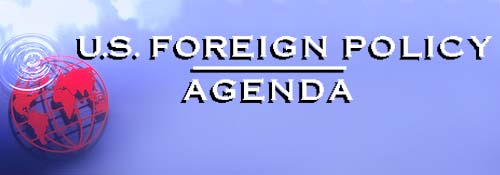Electronic Journal of the Department of State -- Volume 5, Number 1, March 2000
THE MAKING OF U.S. FOREIGN POLICY
Download Adobe Acrobat version | zipped ASCII version

|
The writings presented here reflect the transformation of U.S. foreign policy in recent years -- a process accelerated by the same technological advances which allow this "electronic journal" to be understood as an innovation rather than an oxymoron.
The fundamental purpose of America's foreign policy has not changed in more than two centuries. It is to protect our citizens, our territory, our livelihood, and our friends. |
|
For example, countering terrorism is both a domestic and international law enforcement imperative, requiring vigorous diplomacy, good intelligence, preparations for emergency response, and the possibility of military action. Fighting HIV/AIDS is a medical challenge, an educational and developmental priority, and a foreign policy necessity. Protecting the global environment demands sound science, sophisticated economic expertise, and hard international bargaining.
On most issues, our diplomats must understand and work well not only with foreign counterparts, but also legislators, nongovernmental organizations, outside experts, and representatives from the private sector, both business and labor. The old geopolitical chessboard is no longer two-dimensional.
Today's players are not only nations, but a host of non-state actors. The issues are often not separable, but inter-connected. The rules shift with every scientific breakthrough. And although America has enemies, the outcome is not zero-sum: In the long run, we will all do better, or none of us will.
The pieces gathered here make up a thought-provoking collection by a truly distinguished group of government officials, present and former Members of Congress, and other authorities. I commend them to you. For they describe how the world's leading nation is grappling with the world's hardest problems. And the more widely that process is understood, the better it will work and the more support it will receive.
|
|
